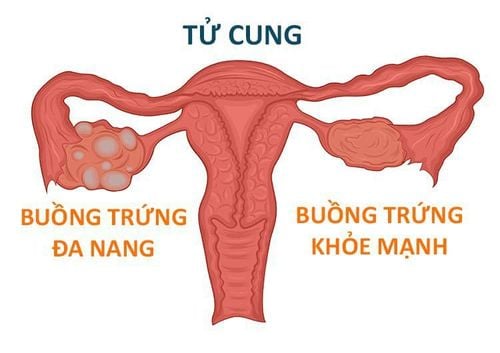This is an automatically translated article.
If you have polycystic ovary syndrome (PCOS), figuring out how to lose weight with PCOS can feel incredibly difficult. These androgens are linked to insulin resistance, which can cause you to store more fat instead of burning it. So, losing weight is especially difficult when you have PCOS but not impossible. Here are 13 useful tips to lose weight when having obesity due to polycystic ovary that many people apply
1. Obesity due to polycystic ovary is difficult to lose weight
If you have polycystic ovary syndrome (PCOS), figuring out how to lose weight with PCOS can feel incredibly difficult. According to the National Institutes of Health, up to 20% of women in the United States have PCOS, a condition characterized by an imbalance of reproductive hormones caused by too much androgen. PCOS is more common in women who are medically overweight or whose mother or sister has PCOS.
In addition to causing problems in a woman's ovaries, high levels of androgens also increase the rate of weight gain. Belly fat reduces insulin response making you more likely to gain weight.
2. Try a low-carb diet to increase your protein intake
It must be said that there is no single diet that is a miracle solution for women with PCOS and the type of diet you choose is less important than how long you can stay on it.
That said, low-carb diets tend to be effective for women with PCOS, as these patients tend to be insulin resistant. Reducing the carb content lowers insulin levels, which can help with weight loss.
A 1200 calorie one day diet with a low carb diet. That means you'll have to increase your protein intake. A diet with 1.5 grams of protein per kilogram of your ideal body weight, about 90 grams of protein per day if your goal is 130 pounds (or about 60 kilograms). Feel free to eat as many non-starchy vegetables as you like (all on the menu are leafy greens, chickpeas, and carrots) and two to four servings of fresh fruit, but remember to skip the high-fat juices. Street.
When starting your weight loss journey you should completely eliminate grains. If you need grains to maintain your diet, you can slowly add up to two servings per day (one slice of wholemeal bread, one cup of oats, one cup of brown rice, one cup of pasta). whole grain tube, etc.).
If you're still having trouble losing or at least maintaining weight on a low-carb diet, you may need to work with your doctor to adjust your calorie intake.
3. Exercise first, eat later
Exercising right before a meal can help re-regulate your metabolism so that you can store more carbs as energy than as fat.
Women with PCOS should focus on high-intensity interval training that uses short bursts of high-intensity energy.
Add more strength training time to your workout. Since muscles use glucose for energy, building more muscle can only improve insulin sensitivity and metabolic health.

Thử một chế độ ăn low-carb để cải thiện béo phì do buồng trứng đa nang
4. Focus on fiber
Higher fiber intake can help you feel fuller for longer with fewer calories. Plus, complex, high-fiber carbs won't spike your blood sugar (and lead to more cravings) in the same way as simple, sugary carbs.
The American Heart Association recommends that each woman get at least 21 to 25 grams of fiber per day.
Adding more fibrous foods to your plate can be especially beneficial if you have PCOS. One study found that a diet higher in fiber was associated with reduced belly fat and insulin resistance in women with PCOS.
The American Heart Association recommends that each woman get at least 21 to 25 grams of fiber per day. For example, adding whole grains, leafy vegetables, legumes, squash and sweet potatoes, will all help with your fiber absorption. If you're still not getting there, try adding fiber to a protein shake or smoothie in the morning.
5. Add healthy fats to your meals
Healthy fats can also keep you full, especially if you're trying to keep carbs to a minimum. According to a study in the Journal of Nutrition, women with PCOS who ate a high-fat diet lost more weight over eight weeks than women with PCOS who ate a lower-fat diet. You can add 200 calories of healthy fats to each meal, such as two tablespoons of olive oil or half an avocado per meal.
6. Eat a lot of fermented foods
Women with PCOS may have less healthy gut bacteria than women without the disease, which could be another reason they struggle with weight gain. Trying to add more healthy bacteria to your system can help.
Even for women without PCOS, recent studies show that adding probiotics to your diet can help with weight loss (though more research is needed to know for sure). benefits of probiotics). Accordingly, you should add a fermented food (which naturally contains beneficial bacteria for gut health) to your diet every day, as well as a probiotic.
7. Reduce your caffeine intake
Caffeine really has a huge effect on hormone levels. Studies have shown that increased caffeine intake can interfere with ovulation and increase stress hormones, which can lead to hormonal disturbances.
Cutting back on caffeine is probably best, but it's completely understandable if that's not realistic. If you have caffeine enjoy it after breakfast (to reduce its impact on your blood sugar) and try to limit yourself to one/cup serving per day.
8. Do not add sugar to meals
Women should eliminate added sugars because it raises blood sugar levels significantly. This then leads to depression and even greater levels of hunger, as well as cravings. This is true for everyone, but for women with PCOS, sugar and insulin spikes are more common, meaning they're even hungrier after consuming processed sugar.9. Practice mindful eating
If you regularly clamp down on a sandwich while driving, talking on the phone and feeling too full afterward, you may benefit from being more mindful of your eating habits.
Sitting at mealtimes, eating slowly without distractions and really enjoying your food can help you regulate your hunger levels, this is a simple way to practice portion control during meals and avoid unconsciously overeating.
10. Make sure you're eating enough
Too much focus on dieting and restricting your calories can also lead to overeating later on. “If you over-restrict your calories or eliminate food groups, your body’s very subtle internal messages and biofeedback will release ghrelin, aka the hunger hormone,” says Vitti. In that case, you'll eat more calories. At night, you might find yourself finishing a bag of chips and being like, "Wow, how did I finish that bag?".
Therefore, try to maintain a scientific diet and have all the necessary nutrients.

Lượng chất xơ cao hơn có thể giúp bạn cảm thấy no lâu hơn với ít calo hơn
11. Stress management
Easier said than done, we know. However, “Stress increases cortisol levels, which is linked to weight gain,” explains Vitti. Chronic stress can cause you to store more fat in your stomach area, so try to manage that stress, whether through deep breathing, meditation, yoga, sleep, or self-care measures. other body.
12. Consider a Supplement
Some dietary supplements are very good for women with PCOS. Vitamin C, selenium, N-acetylcystine, and alpha-lipoic acid gently support the liver in improving its ability to break down excess estrogen in the body that women with PCOS have.
These supplements also help improve metabolism, and myo-inositol, in particular, has been shown to help women with PCOS lose weight, due to its ability to help with insulin sensitivity. Just remember to always talk to your doctor before adding any supplements to make sure they won't affect any other conditions you have or the medications you take.
13. If you have sleep problems, don't ignore them
A common side effect of PCOS is sleep apnea, which disrupts sleep. Lack of sleep causes weight gain because it messes with the hormones that control hunger and fullness. Try to close your eyes for at least seven hours each night and talk to your doctor if you think you may have sleep apnea.
Your doctor can sign you up for a sleep study to confirm that you have sleep apnea and, if you do, prescribe a continuous positive airway pressure (CPAP) device, a The mask you will wear when you sleep to gently blow air into your airways.
Losing weight when you have polycystic ovary syndrome may not be easy, if the above tips are not really effective, you should go to specialized medical facilities for examination and treatment.
Please dial HOTLINE for more information or register for an appointment HERE. Download MyVinmec app to make appointments faster and to manage your bookings easily.
Reference source: healthline.com













